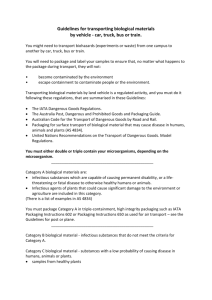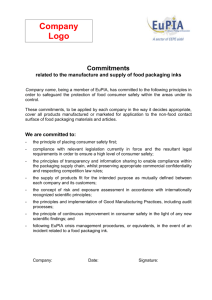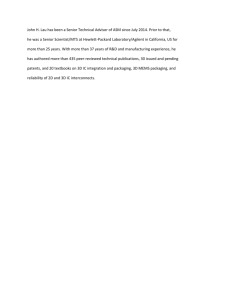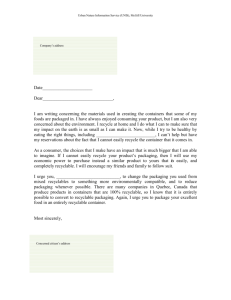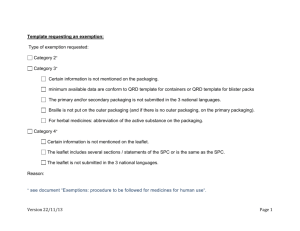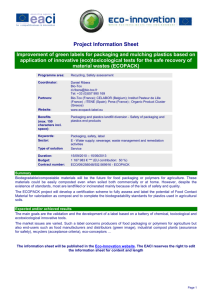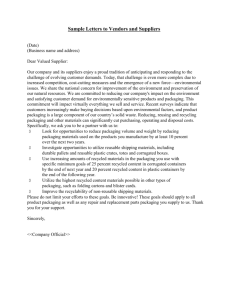workinstruction for transportation of biological material and gmo`s
advertisement
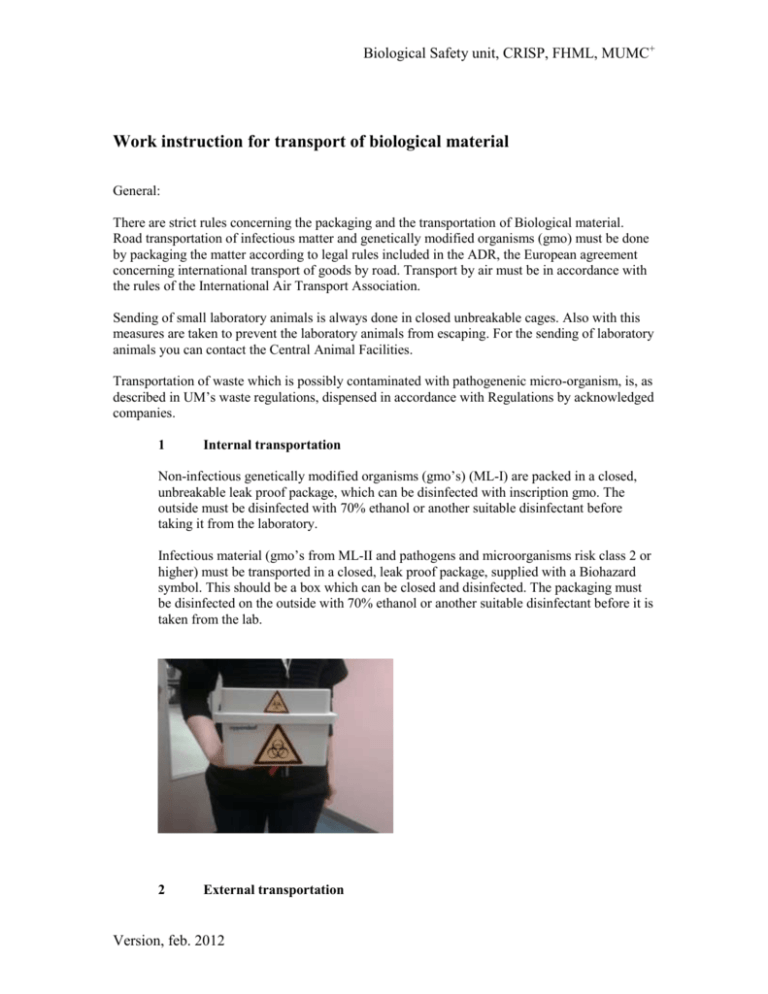
Biological Safety unit, CRISP, FHML, MUMC+ Work instruction for transport of biological material General: There are strict rules concerning the packaging and the transportation of Biological material. Road transportation of infectious matter and genetically modified organisms (gmo) must be done by packaging the matter according to legal rules included in the ADR, the European agreement concerning international transport of goods by road. Transport by air must be in accordance with the rules of the International Air Transport Association. Sending of small laboratory animals is always done in closed unbreakable cages. Also with this measures are taken to prevent the laboratory animals from escaping. For the sending of laboratory animals you can contact the Central Animal Facilities. Transportation of waste which is possibly contaminated with pathogenenic micro-organism, is, as described in UM’s waste regulations, dispensed in accordance with Regulations by acknowledged companies. 1 Internal transportation Non-infectious genetically modified organisms (gmo’s) (ML-I) are packed in a closed, unbreakable leak proof package, which can be disinfected with inscription gmo. The outside must be disinfected with 70% ethanol or another suitable disinfectant before taking it from the laboratory. Infectious material (gmo’s from ML-II and pathogens and microorganisms risk class 2 or higher) must be transported in a closed, leak proof package, supplied with a Biohazard symbol. This should be a box which can be closed and disinfected. The packaging must be disinfected on the outside with 70% ethanol or another suitable disinfectant before it is taken from the lab. 2 External transportation Version, feb. 2012 Biological Safety unit, CRISP, FHML, MUMC+ For external transportation and sending of biological material a triple containment is always necessary, it must consist of: 1. Hermetically sealed, leak proof, unbreakable first container (Eppendorf tube, bottle etc.) on which the contents and the obligatory containment level is mentioned. 2. Hermetically sealed, leak proof, unbreakable second container, in which the first container is surrounded by sufficient absorbing material for the whole contents, f.i. a 50 ml greiner tube, closed with a turning lid and seal, and in between the tissues that can absorb the contents of the first container. 3. The outside of the packaging of the triple containment must be a sturdy, f.i. a firm box. (Complete packaging: art. 1005205, warehouse azM) In case the package contains (dry)ice or another cooling medium, a suitable package must be used. A suitable package can be obtained from the azM warehouse. For transport of the various samples by road specific packing and labeling are a must. These are stated in the table. Next to that the following regulations must be applied: 1 When transporting liquids the outside needs to have the following orientation sticker on oppposite sides pf the package. Color black or red on white background. 2 If the material is sent on dry ice addional specifications are required: Maximum total weight of 25 kg per submission Minimum size of box: 25x25x25 Version, feb. 2012 Biological Safety unit, CRISP, FHML, MUMC+ When transporting by road the package must be labelled with an extra label: UN 1845 on which the amoutn of dry ice is reported. When transporting by air the label for class 9 needs to be administered. The amount of dry ice must be sufficient for at least 3 days (10 kg). For information about longer transport one can call Bohmdroogijs: 0181 600800. In all cases the box with dry ice needs to be padded with styrofoam or another dry filling material. Packaging must be such that pressure build up is not possible inside the package. The primary and secondary package must be able to withstand low temperatures. 3 If Liquid Nitrogen is used for shipping, an outside package orientation label needs to be fitted (see 1) together with a ADR class 2 and a UNI1977 label (if possible integrated as in the following example). Every transport by road or air must be equipped with a freight letter in which is stated: Place and date of drawn up Name and adress of sender Name and adress of carrier Name and adress of adressee Place and date of receipt of goods and the palce ment for deliverance of goods Correct transportname of amterial: see colum 4 of the table. Gross weight or the amount of goods. 4 If transporting animal material yourself, a sticker with Cat.1 for Research and Diagnostics, realized in black and white letters behind the front window of the car. Sticker can be obtained from the BSO. Version, feb. 2012 Biological Safety unit, CRISP, FHML, MUMC+ Table: Overview of the packaging and labelling demands for sending biologiccal material Packaging material Humane diagnostic and research material, not contaminated with pathogens class 3 or 4 Labeling: Triple containment of which the outside is sturdy Animal diagnostic and research material, not contaminated with pathogens of risk class 3 or 4 For Research and diagnostics only black and white letters Non infectious GMO’s Infectious material, pathogenic for man and animal of risk class 2 or higher and classified as Cat. A Version, feb. 2012 Documents besides the freight letter and naming Biological Substance B Remarks for air transport Trade document if the submission is within the EU (see work instruction and safe working with animal material) For outside EU: country specific demands. Max. 4 kg Total contents of material Max. 4 kg Total contents of material On the freight letter the indication: ”Genetically modified organisms” UN approved sturdy packaging that also go for 2814 + On the freight letter the indication: infectious substance affecting humans Max. contents primary container; 100 gram Shippers declaration is signed by recognized carrier. Biological Safety unit, CRISP, FHML, MUMC+ Infectious material, pathogenic for animals UN approved sturdy packaging that also go for 2814 + UN 2900 label Freight letter with indication: Infectious substance affecting animals Maxi. Contents primary container: 100 grams Shippers declaration is signed by recognized carrier Remark: in case of combined air- and road transport follow the demands of airtravel. Version, feb. 2012 Biological Safety unit, CRISP, FHML, MUMC+ Example of Freightletter when sending GMO Freightletter/transportation document Date: Sender Name: Address: Name responsible for sending: Telephone number sender: Packing Description For example: 1 fibre box genetically modified organisms Consignee Name: Address: Name consignee: Telephone number consignee: Class Quantity UN 3245 9 ADR Total Quantity ………. Version, feb. 2012
